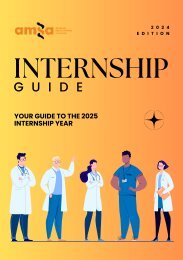AJGH Nexus - Volume 17 2023
AMSA Journal of Global Health (AJGH) 2023 Issue "Nexus"
AMSA Journal of Global Health (AJGH) 2023 Issue "Nexus"
Create successful ePaper yourself
Turn your PDF publications into a flip-book with our unique Google optimized e-Paper software.
ANNUAL GLOBAL HEALTH<br />
INTENSIVE <strong>2023</strong>:<br />
Tackling Non-Communicable Diseases Through<br />
Nutrition and Disaster Risk Reduction<br />
In August <strong>2023</strong>, AMSA Global Health<br />
Intensive (AGHI) will convene in Melbourne<br />
with the objective of offering delegates a<br />
dialectical and hands-on approach to<br />
understanding the current issues surrounding<br />
non-communicable diseases (NCDs). NCDs<br />
account for 74% of deaths globally, and are<br />
inequitably distributed, with almost 85% of<br />
those deaths occurring in Low- and Middle-<br />
Income Countries (LMICs).[1] Elevated blood<br />
pressure, cholesterol, obesity and insulin<br />
resistance often arise from malnutrition and<br />
are risk factors for many NCDs, including<br />
cardiovascular disease, various cancers and<br />
type 2 diabetes mellitus. Importantly,<br />
malnutrition includes both deficient nutrient or<br />
energy intake, such as wasting and stunting,<br />
and excessive or imbalance intake, which can<br />
lead to obesity.<br />
In addition to nutritional concerns, the impact<br />
of climate change in Australia, with bushfires<br />
having caused much destruction in 2019-<br />
2020, has precipitated the need for a<br />
coherent policy relating to disaster<br />
management and NCDs. The United Nations<br />
Office for Disaster Risk Reduction (UNDRR)<br />
considers it vital to examine climate change<br />
policies in conjunction with planning for<br />
disasters.[2] The establishment of the Royal<br />
Commission in National Natural Disaster<br />
Arrangements in 2020 in response to the 2020<br />
bushfires along with the United Nations’<br />
Sendai Framework for Disaster Risk Reduction<br />
2015-2030 are exemplary of the importance of<br />
educating medical students on NCDs rather<br />
than simply focusing on infectious diseases in<br />
emergency situations.[2, 3]<br />
I. NCDs and Nutrition<br />
Many countries now experience a double<br />
burden of malnutrition where both under and<br />
overnutrition coexist within the population.[4]<br />
Access to a diversity of nutrient-dense foods,<br />
such as fruits and vegetables, is not equitable<br />
and many rely upon high-calorie, nutrientpoor<br />
staples for sustenance.[5] In addition,<br />
many unhealthy foods that are high in salt,<br />
sugar and saturated fats have become<br />
cheaper and more widely available.<br />
Furthermore, the World Health Organisation<br />
(WHO) has classified processed meat,<br />
including hot-dogs, ham, and bacon, as a<br />
Group 1 carcinogen - meaning it is known to<br />
cause cancer.[6] As a result of global<br />
increases in processed, nutrient-poor, food<br />
and meat consumption, the global NCD<br />
burden has been rising. As future doctors that<br />
will care for patients with NCDs, it’s critical<br />
that we are able to counsel and guide<br />
patients. Understanding the causes and<br />
associated risk factors for NCDs will allow us<br />
to better counsel patients and, ideally,<br />
prevent patients from NCDs. Unfortunately,<br />
many of us feel ill equipped to counsel and<br />
educate patients on nutrition.<br />
One study had medical students in their<br />
clinical years complete a questionnaire to<br />
assess their knowledge, attitudes and selfefficacy<br />
related to nutrition knowledge.[7] The<br />
study found that students had an overall<br />
mean knowledge score of 64%, with a lower<br />
score found on topics related to obesity and<br />
diabetes.[7] This is not surprising as nutrition is<br />
not sufficiently incorporated into medical

















